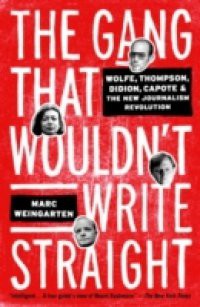. . . In Cold Blood, The Electric Kool-Aid Acid Test, Fear and Loathing in Las Vegas, Slouching Towards Bethlehem, The Armies of the Night . . .Starting in 1965 and spanning a ten-year period, a group of writers including Tom Wolfe, Jimmy Breslin, Gay Talese, Hunter S. Thompson, Joan Didion, John Sack, and Michael Herr emerged and joined a few of their pioneering elders, including Truman Capote and Norman Mailer, to remake American letters. The perfect chroniclers of an age of frenzied cultural change, they were blessed with the insight that traditional tools of reporting would prove inadequate to tell the story of a nation manically hopscotching from hope to doom and back againfrom war to rock, assassination to drugs, hippies to Yippies, Kennedy to the dark lord Nixon. Traditional just-the-facts reporting simply couldnt provide a neat and symmetrical order to this chaos.Marc Weingarten has interviewed many of the major players to provide a startling behind-the-scenes account of the rise and fall of the most revolutionary literary outpouring of the postwar era, set against the backdrop of some of the most turbulentand significantyears in contemporary American life. These are the stories behind those stories, from Tom Wolfes white-suited adventures in the counterculture to Hunter S. Thompsons drug-addled invention of gonzo to Michael Herrs redefinition of war reporting in the hell of Vietnam. Weingarten also tells the deeper backstory, recounting the rich and surprising history of the editors and the magazines who made the movement possible, notably the three greatest editors of the eraHarold Hayes at Esquire, Clay Felker at New York, and Jann Wenner at Rolling Stone. And finally Weingarten takes us through the demise of the New Journalists, a tragedy of hubris, miscalculation, and corporate menacing.This is the story of perhaps the last great good time in American journalism, a time when writers didnt just cover stories but immersed themselves in them, and when journalism didnt just report America but reshaped it.Within a seven-year period, a group of writers emerged, seemingly out of nowhereTom Wolfe, Jimmy Breslin, Gay Talese, Hunter S. Thompson, Joan Didion, John Sack, Michael Herrto impose some order on all of this American mayhem, each in his or her own distinctive manner (a few old hands, like Truman Capote and Norman Mailer, chipped in, as well). They came to tell us stories about ourselves in ways that we couldnt, stories about the way life was being lived in the sixties and seventies and what it all meant to us. The stakes were high; deep fissures were rending the social fabric, the world was out of order. So they became our master explainers, our town criers, even our moral consciencethe New Journalists. from the IntroductionFrom the Hardcover edition.

